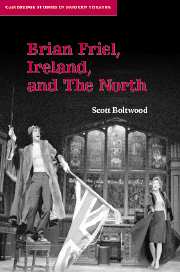Book contents
- Frontmatter
- Contents
- Acknowledgments
- List of abbreviations
- Introduction: Friel, criticism, and theory
- 1 The Irish Press essays, 1962–1963: Alien and native
- 2 The plays of the 1960s: Assessing partition’s aftermath
- 3 The plays of the 1970s: Interrogating nationalism
- 4 Plays 1980–1993: The North
- 5 Plays 1994–2005: Retreat from Ireland and The Home Place
- Notes
- Works cited
- Index
2 - The plays of the 1960s: Assessing partition’s aftermath
Published online by Cambridge University Press: 22 September 2009
- Frontmatter
- Contents
- Acknowledgments
- List of abbreviations
- Introduction: Friel, criticism, and theory
- 1 The Irish Press essays, 1962–1963: Alien and native
- 2 The plays of the 1960s: Assessing partition’s aftermath
- 3 The plays of the 1970s: Interrogating nationalism
- 4 Plays 1980–1993: The North
- 5 Plays 1994–2005: Retreat from Ireland and The Home Place
- Notes
- Works cited
- Index
Summary
The unexpected success of Philadelphia, Here I Come! in September 1964 has traditionally been ascribed to the metamorphosis of Friel's dramatic apprenticeship transformed by the intense experience of his brief participation with the Tyrone Guthrie Theater in 1963. However, the regular requirements of writing his eclectic byline for The Irish Times must also be recognized as equally valuable to his education as a professional writer, for forcing upon him considerable practical discipline as well as allowing him even greater artistic freedom. More significantly, the articles reveal the writer as restlessly vacillating between the differing positions of a polyvalent cultural identity; as the objectified foreigner, he fails to win enfranchisement in his ideological homeland; as the subjugated other of colonial domination, he is disowned and alienated in his birth land. This restless inability to claim an artistic locale expresses itself in the plays of the 1960s as well – most literally in the serial displacements from Iona, to Ballybeg, to the region around Cork, to Ballymore in County Tyrone, back to the environs of Ballybeg, and finally to Dublin. After the mid 1970s Ballybeg becomes Friel's most popular dramatic location, yet he is unable to inhabit this setting consistently until after his definitive and formal break with nationalist politics in 1967. Indeed, I will later argue that his eventual ability to inhabit Ballybeg imaginatively will increasingly correspond to its emergence not as a site of Nationalist Irishness, but of Northern identity.
Information
- Type
- Chapter
- Information
- Brian Friel, Ireland, and The North , pp. 39 - 77Publisher: Cambridge University PressPrint publication year: 2007
